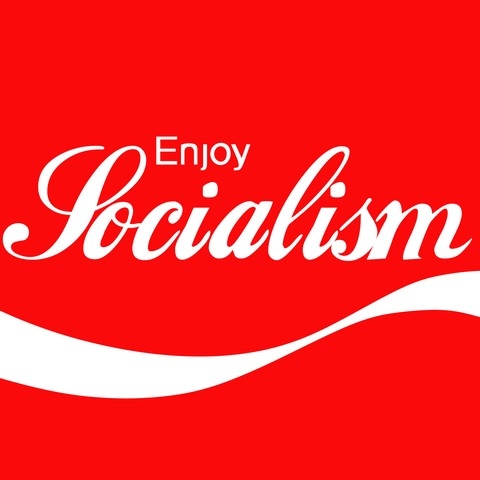In 1936, when Franklin Roosevelt sought reelection to the presidency, some of his critics labeled him a “socialist.” The charge was so bombastic that FDR’s White House moved quickly to rebut it, labeling it an accusation “which no patriotic, honorable, decent citizen would purposefully inject into American affairs.”
That was then. Today, in America, for the first time in nearly a century, socialism is not a dirty word, or a nasty label, for many people. On the contrary. President Obama, with a minimum of controversy, reopened relations with the socialist regime in Cuba, demanding almost no concessions in exchange for becoming the first U.S. president in 88 years to visit the island. On the eve of the president’s arrival, Cuba’s Ministry of Foreign Affairs declared that Cuba — together with China — was committed to the “irreversibility of socialism.”
Meanwhile, the overwhelming and improbable support among America’s youth for the 78-year-old Bernie Sanders — a self-described democratic socialist who once proudly defended communist dictatorships across the world — is the latest example of historical illiteracy that treats socialism as a benign economic system that is more equitable and fair than capitalism. A Pew poll shows a staggering 69 percent of voters under 30 expressing a willingness to vote for a socialist for president of the United States. Look at his lead in Democrat Party polls as the 2020 primary season ramps up. A more recent YouGov survey found that voters under 30 actually have a higher opinion of socialism than they do of capitalism.
“For older people, socialism is associated with communism and the Soviet Union and the Cold War,” says Michelle Diggles, a senior policy analyst at Third Way, a liberal D.C. think tank. “The oldest millennials were 8 years old when the Berlin Wall fell. They have never known a world where the Soviet Union exists. … The connotations associated with the word ‘socialism’ just don’t exist with millennials.”
Watching the false hope of socialism be resurrected in the midst of the ignorance of basic 20th-century history is particularly threatening. Young people today are really not taught about “all” of World history — just the portions today’s socialist teachers and professors care to discuss as “relevant” and “appropriate” for America’s young learners. All teachers nor all professors are socialists. But it’s tough to find a high school in a U.S. major city or a university today in which a majority of teachers and professors do not support Socialism.
Today, 20 percent of the world’s population continues to live under communist regimes, in China, Vietnam, Cuba, Laos and North Korea. These countries are some of the worst violators of human rights in history. China operates its own “gulag” system of labor camps for political prisoners. Cuba’s leaders routinely throw their opponents in prison, despite Raúl Castro’s misleading comments at his news conference with Obama during Obama’s visit. There remain more than 50 political prisoners in Cuba, which the new President still denies.

Maybe we should have seen this loss of historical memory coming nearly 25 years after the collapse of the Soviet Union. Perhaps we should have heard the alarm bells of a 2011 Newsweek survey that reported 73 percent of Americans “couldn’t correctly say why we fought the Cold War” in response to a question taken from the official test for U.S. citizenship. Ignorance of socialism and America’s decadeslong struggle against it has become the norm, and the data suggest this norm will only harden as a generation of Americans pass away and national memory fades.
For a generation with no memory of bomb shelter drills or sledgehammers smashing the Berlin Wall to pieces, the sad reality of life under socialist rule has been forgotten, and the lessons of the Cold War have been relegated to the “ash heap of history” alongside communism. Instead, the concept of socialism has often been confused with liberalism. Socialism seems like a fine idea that means a more socially equitable society for everyone—free health care and free education for starters. Socialism conjures the image of a place like Sweden and Denmark, which contrary to popular belief, are not socialist systems at all. In fact, the Danish Prime Minster responded to claims by Senator Bernie Sanders that the Scandinavian countries were socialist by saying: “Denmark is far from a socialist planned economy. Denmark is a market economy.”
Socialism is not roads, welfare, and free education. Socialism has always had a more ominous goal and shares close historical and ideological connections with more reviled terms: Marxism and communism. Karl Marx took socialism to what he viewed as its natural conclusion: The “abolition of private property.” It’s horrifying to those of us who remember the slide from Socialism into Communism by those countries in Eastern Europe. Soviet Russia during the cold war killed untold numbers of its own citizens as part of its former socialist then Communist hard-nose governing.
As we face the 2020 election and Democrats are scrambling on the campaign trail to chase the elusive Democrat nomination to run against President Trump, the elusive pipe dream of the utopia of Socialism is the “promise of the day.” All but two of the Democrat candidates have left the door open to running in the general election as a “democratic socialist” candidate — whatever that means. And they all promise Medicare for all, free college, the Green New Deal, and other socialist ideas that are as practical and real as are the tooth fairy and Santa Claus. It’s bad enough that these candidates — who are almost all in the federal government already — are actually promoting this “totalitarian lite” economic system to Americans. But millions of Millenials actually believe the government can underwrite $100 Trillion + of “extra” money to underwrite the socialist Manifesto! They sell it as “equality, fairness, and America’s wealth spread equally rather than being held by 5% of the nation’s population.”
Class warfare is a long-running theme in socialism, even in this country. American socialist (and failed presidential candidate) Eugene Debs promised a world where “no man will work to make a profit for another.” Even earlier, French socialist Jean Jaurès lamented: “All this misery, all this injustice, and disorder, results from the fact that one class monopolizes the means of production and of life, and imposes its laws on another class and on society as a whole.” Jaurés said that to equalize things, “to break down the supremacy of one class,” the ultimate “aim of socialism, whether collectivist or communist, is to transform the capitalist property into social property.”
The process of transforming “capitalist property”— that is, something legitimately purchased, inherited or otherwise earned — into “social property” for everyone is when socialism becomes dramatically scary. This promise of redistribution always involves winners and losers picked by the government. What if one has acquired the property by purchase or inheritance and does not wish it to become “social property?” Well, then the government might have to step in and take it.
The loss of private property — which guarantees one’s independent livelihood — will result in the abolishment of one’s ability to exercise free speech. What if the owner of some capitalist property taken by the government dares to protest its seizure? That sort of dissent must be stifled to maintain order, so free speech is replaced by government-sanctioned propaganda. Unpopular opinions are shamed, and those expressing them are barred from discussions or seminars, columns or talk shows — even colleges and universities.
How do we know? Because we’ve seen it happen time and again. One hundred + years ago, the Bolshevik Revolution in Russia showed the danger of combining socialist ideas with totalitarian violence, which created modern totalitarian communism. It was Bolshevik leader Vladimir Lenin who expressed a sort of unifying theory, finally installing Marx’s goals. “In striving for socialism,” Lenin said in 1917, “we are convinced it will develop into communism.” The result in more than 40 national experiments since then has been either totalitarian dictatorship or economic collapse, costing some 100 million lives before the communist experiment collapsed in Europe and the Soviet Union.
To be sure, not everyone in these societies was a loser, which gets at one of the great paradoxes of all socialist systems: the extreme inequality that allows a cabal of party members to control the political and economic power in a country while ignoring an overwhelming majority of the citizens. Only socialist countries have achieved the distinction of launching rockets into outer space while millions of their citizens starve to death in famine. Now that’s inequality!
The Center for Global Policy at George Mason University has recorded an interesting historical development. Its Political Instability Task Force plotted a chart showing the percentage of countries in which mass killings were occurring from the end of World War II until the present day. For most of the second half of the 20th century, that percentage increased steadily. Then, in the early 1990s, a huge drop occurred, and in the last decade, we have seen the lowest percentage of countries on Earth with ongoing mass killings ever recorded. What happened in the early 1990s? The Cold War ended and millions were freed from behind communist walls and secret police holding cells. This was also when our millennial generation was born.
There is a very wide generation gap in today’s socialist comeback. Nate Silver points out that while polling shows a plurality of voters under 30 supporting socialism, that figure drops to a mere 15 percent among those over 65. The reason for this is not difficult to see. It reflects a difference in personal experience.
Millennials either missed the Cold War entirely or were young children in its final years, with little or no concept of the triumph of liberty achieved with the fall of the Berlin Wall and the collapse of the Union of Soviet Socialist Republics (USSR). They do not understand the menace that socialism — combined with power — posed to the people it enslaved and to the free nations that it threatened. The violence and brutality of the communist regimes of the past mean nothing to Millenials, just lines in the history book somewhere between the Spanish-American War and 9/11.
It’s more personal for older Americans. Perhaps some of their friends or neighbors — or they themselves — arrived in this country just ahead of Soviet tanks that were rolling into their homeland. Perhaps they remember the stories of citizens of these supposed utopian socialist prison states arrested, “disappeared,” tortured, or shot simply for trying to cross a border. Perhaps they remembered cowering under their school desks during drills in case of a nuclear attack, planned in communist Russia and launched from communist Cuba.
This is the context young American voters should know as they prepare to cast their vote this year — many of them for the first time. We should all remember the power of words and ideologies, and how debunked ideas can flourish again as memories of their failure fade. We cannot forget the lessons of history. All of us, but especially the youngest among us who will have to live in that world for the longest, should make this election about the future by rejecting the ugly, violent legacy of socialism’s past.
And we Moms and Dads — and Grandparents too — should make certain our kids and grandkids KNOW the differences between capitalism, socialism, and communism, and not just the good of each. Take some time and visit with them giving examples of each, both pluses and minuses.
Millennials may be torn a hundred different ways with distractions of unimaginable kinds to us, but we cannot afford for their children to live through a generation of more lies and mischaracterizations of capitalism, socialism, and communism. Not knowing something doesn’t make somebody stupid. No knowing something for certain and NOT getting the truth about it means somebody is stupid.
Podcast: Play in new window | Download


